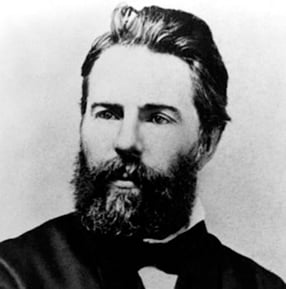From “Clarel” [Symphonies]
Meanwhile with Vine there, Clarel stood
Aside in friendly neighborhood,
And felt a flattering pleasure stir
At words—nor in equivocal tone
Freakish, or leaving to infer,
Such as beforetime he had known—
Breathed now by that exceptional one
In unconstraint:
“’Tis very much
The cold fastidious heart to touch
This way; nor is it mere address
That so could move one’s silver chord.
How he transfigured Ungar’s sword!
Delusive is this earnestness
Which holds him in its passion pale—
Tenant of melancholy’s dale
Of mirage? To interpret him,
Perhaps it needs a swallow-skim
Over distant time. Migrate with me
Across the years, across the sea.—
How like a Poor Clare in her cheer
(Grave Sister of his order sad)
Showed nature to that Cordelier
Who, roving in the Mexic glade,
Saw in a bud of happy dower
Whose stalk entwined the tropic tree,
Emblems of Christ’s last agony:
In anthers, style, and fibers torn,
The five wounds, nails, and crown of thorn;
And named it so the passion-flower.
What beauty in that sad conceit!
Such charm, the title still we meet.
Our guide, methinks, where’er he turns
For him this passion-flower burns;
And all the world is elegy.
A green knoll is to you and me
But pastoral, and little more:
To him ’tis even Calvary
Where feeds the Lamb. This passion-flower—
But list!”
Hid organ-pipes unclose
A timid rill of slender sound,
Which gains in volume—grows, and flows
Gladsome in amplitude of bound.
Low murmurs creep. From either side
Tenor and treble interpose,
And talk across the expanding tide:
Debate, which in confusion merges—
Din and clamor, discord's hight:
Countering surges—paeans—dirges—
Mocks, and laughter light.
But rolled in long ground-swell persistent,
A tone, an under-tone assails
And overpowers all near and distant;
Earnest and sternest, it prevails.
Then terror, horror—wind and rain—
Accents of undetermined fear,
And voices as in shipwreck drear:
A sea, a sea of spirits in pain!
The suppliant cries decrease—
The voices in their ferment cease:
One wave rolls over all and whelms to peace.
But hark—oh, hark!
Whence, whence this stir, this whirr of wings?
Numbers numberless convening—
Harps and child-like carolings
In happy holiday of meaning:
To God be glory in the hight,
For tidings glad we bring;
Good will to men, and peace on earth
We children-cherubs sing!
To God be glory in the depth,
As in the hight be praise;
He who shall break the gates of death
A babe in manger rays.
Ye people all in every land,
Embrace, embrace, be kin:
Immanuel’s born in Bethlehem,
And gracious years begin!
It dies; and, half around the heavenly sphere,
Like silvery lances lightly touched aloft—
Like Northern Lights appealing to the ear,
An elfin melody chimes low and soft.
That also dies, that last strange fairy-thrill:
Slowly it dies away, and all is sweetly still.
From Clarel: A Poem, and a Pilgrimage in the Holy Land (G. P. Putnam’s Sons, 1876) by Herman Melville. This poem is in the public domain.

